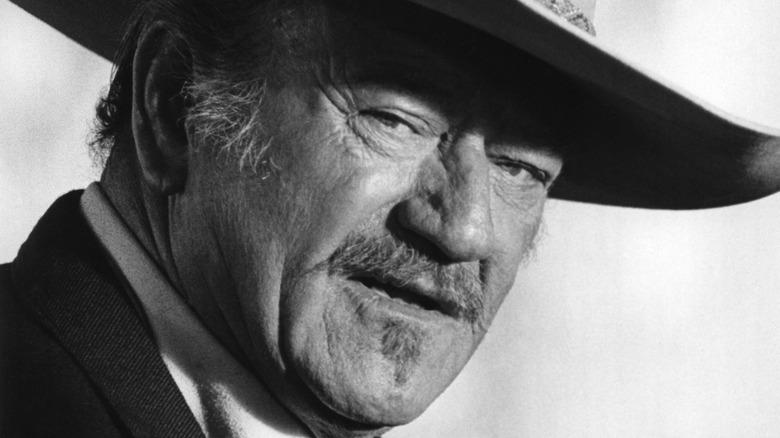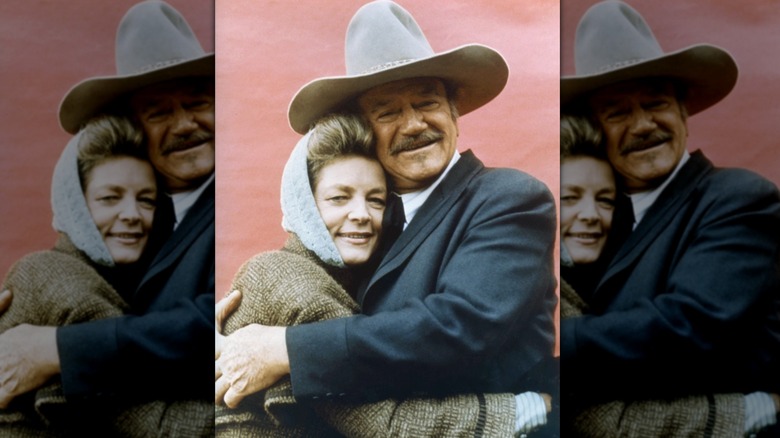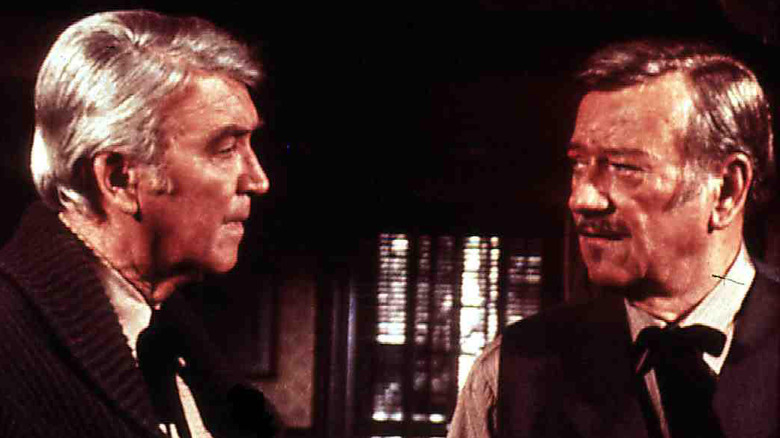John Wayne Refused To Break One Of The Cardinal Rules Of Westerns On His Final Movie
Not unlike other Hollywood legends like Clint Eastwood, John Wayne was very protective of his image as an archetypal rugged American hero. He spent decades shaping it, accepting a new name and new looks to further it for Hollywood, and aggressively pushed a conservative interpretation of the ideals that image presented off-screen. On-screen, he was very particular about what he would and wouldn't do, lest his persona and beliefs be rattled.
Wayne passed on the chance to spoof his iconic Western characters as the Waco Kid in Mel Brooks' "Blazing Saddles," having found the script too risqué for him to play (though he told Brooks he found it hilarious and would assuredly see the finished film). He was less sanguine about "1941" — not only did he turn down the part of General Joseph Stilwell, but he tried to talk Steven Spielberg out of making the film at all on the grounds that it was "un-American" (per Entertainment Weekly). And having turned down the lead in "High Noon," Wayne went on to call it "the most un-American thing I've ever seen in my whole life" (via The Guardian).
When he did accept a part, Wayne would resist material he didn't feel was appropriate to his image. That stubborn commitment followed him to the very end of his career. In his final role, that of J.B. Books in "The Shootist," Wayne refused to break with the honorable archetype of the Western hero and shoot a character in the back, even when said character was a villain.
He pulled his character away from the original novel
"The Shootist," released in 1976, was based on a novel of the same name by Glendon Swarthout, though the film rights were purchased before the book reached publication. It was originally thought of as a vehicle for George C. Scott, but the financiers insisted on John Wayne as the star. The part of J.B. Books came with a poignant resonance to Wayne's own life at the time — Books was an aging legend dying of cancer, and the 68-year old actor had endured a bout with lung cancer and was a few years away from being diagnosed with the stomach cancer that would kill him.
An elderly, dying hero grappling with his legacy and mortality was in itself a departure from Wayne's general persona, albeit a modest one. He went along with that aspect of the character. But he was contractually guaranteed script approval over "The Shootist," and he had demands before cameras rolled. In the novel and in the initial script, there was a significant enough amount of profanity to offend Wayne's sensibilities — that had to go. The Duke was also uncomfortable with some of the implications of his character's physical examination by a doctor, though he didn't insist on cutting the scene.
Wayne's strongest objections had to do with the finale — not only Books' shooting a man in the back, but his own death at the hands of a young admirer who puts the mortally-wounded gunslinger out of his misery. The script was changed, both to alter Books' final fight and to have him die of his wounds instead of from a child's mercy killing.
Wayne pushed for changes throughout filming
Friends of John Wayne have speculated that "The Shootist's" story of a dying Western icon, combined with his increasingly poor health, left him in an irritable mood throughout filming. His reputation for professionalism on-set wasn't entirely betrayed, but he was uneasy and defensive of his image even after the script had been adjusted to suit his needs. He had to be persuaded to grow J.B. Books' mustache and patch against his natural instincts. And he was unhappy with the unit photographer, for two reasons: It wasn't his usual friend Dave Sutton taking the photos, and the photographer was fond of behind-the-scenes moments such as an actor getting make-up applied with a powder puff, an image Wayne was loathe to have floating around in public.
Throughout filming, Wayne gave copious notes to director Don Siegel, sometimes intensely, to the point that Siegel felt creatively stifled and told the actor off. Fights included the detail of what kind of cancer Books was experiencing in the story — Wayne insisted on prostate cancer, considering that a more "manly" ailment than the original bladder cancer. He groused about Siegel's attitude toward the feedback and sought to get even with him.
For his part, Siegel eventually came to accept the consensus of Wayne's longtime associates — that his short temper was shallow and not to be taken seriously. After one clash, the pair shared heartfelt apologies and appreciation for each other's talents, and the Duke went on to demonstrate his commitment to the part and his deference to the director's authority.


